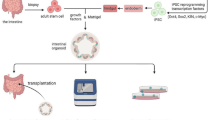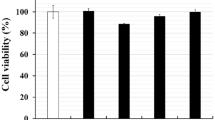Abstract
Infections by enterotoxigenic Escherichia coli (ETEC) result in large economic losses to the swine industry worldwide. Dietary supplementation with amino acids has been considered as a potential mechanism to improve host defenses against infection. The goal of this study was to determine whether methionine deprivation alters ETEC interactions with porcine intestinal epithelial cells. IPEC-1 cells were cultured in media with or without l-methionine. Methionine deprivation resulted in enhanced ETEC adhesion and increased both the cytotoxicity and apoptotic responses of IPEC-1 cells infected with ETEC. Methionine deprivation inhibited IPEC-1 cell autophagic responses, suggesting that the increased cytotoxicity of ETEC to methionine-deprived IPEC-1 cells might be due to defects in autophagy.



Similar content being viewed by others
References
Bauchart-Thevert C, Stoll B, Chacko S et al (2009) Sulfur amino acid deficiency upregulates intestinal methionine cycle activity and suppresses epithelial growth in neonatal pigs. Am J Physiol Endocrinol Metab 296:E1239–E1250
Chen X, Huan H, Wan T et al (2014a) Antigenic determinants analysis and detection of virulence factors in F18 fimbriae Escherichia coli strains isolated from pigs. Acta Microbiol Sinica 54:236–242
Chen Y, Li D, Dai Z et al (2014b) l-Methionine supplementation maintains the integrity and barrier function of the small-intestinal mucosa in post-weaning piglets. Amino Acids 46:1131–1142
Deretic V, Levine B (2009) Autophagy, immunity, and microbial adaptations. Cell Host Microbe 5:527–549
Fairbrother JM, Nadeau E, Gyles CL (2005) Escherichia coli in postweaning diarrhea in pigs: an update on bacterial types, pathogenesis, and prevention strategies. Anim Health Res Rev 6:17–39
Fleckenstein JM, Hardwidge PR, Munson GP et al (2010) Molecular mechanisms of enterotoxigenic Escherichia coli infection. Microbes Infect 12:89–98
Laxman S, Sutter BM, Tu BP (2014) Methionine is a signal of amino acid sufficiency that inhibits autophagy through the methylation of PP2A. Autophagy 10:386–387
Li P, Yin YL, Li D et al (2007) Amino acids and immune function. Br J Nutr 98:237–252
Metayer S, Seiliez I, Collin A et al (2008) Mechanisms through which sulfur amino acids control protein metabolism and oxidative status. J Nutr Biochem 19:207–215
Metayer-Coustard S, Mameri H, Seiliez I et al (2010) Methionine deprivation regulates the S6K1 pathway and protein synthesis in avian QM7 myoblasts without activating the GCN2/eIF2 alpha cascade. J Nutr 140:1539–1545
Mizushima N, Yoshimori T, Levine B (2010) Methods in mammalian autophagy research. Cell 140:313–326
Newsholme P, Abdulkader F, Rebelato E et al (2011) Amino acids and diabetes: implications for endocrine, metabolic and immune function. Front Biosci (Landmark Ed) 16:315–339
Ren W, Luo W, Wu M et al (2013) Dietary l-glutamine supplementation improves pregnancy outcome in mice infected with type-2 porcine circovirus. Amino Acids 45:479–488
Russell RC, Yuan HX, Guan KL (2014) Autophagy regulation by nutrient signaling. Cell Res 24:42–57
Sakiyama T, Musch MW, Ropeleski MJ et al (2009) Glutamine increases autophagy under Basal and stressed conditions in intestinal epithelial cells. Gastroenterology 136:924–932
Sakkas P, Jones LA, Houdijk JG et al (2013) Leucine and methionine deficiency impairs immunity to gastrointestinal parasites during lactation. Br J Nutr 109:273–282
Sutter BM, Wu X, Laxman S et al (2013) Methionine inhibits autophagy and promotes growth by inducing the SAM-responsive methylation of PP2A. Cell 154:403–415
Tamayo E, Postigo J, Del Giudice G et al (2009) Involvement of the intrinsic and extrinsic cell-death pathways in the induction of apoptosis of mature lymphocytes by the Escherichia coli heat-labile enterotoxin. Eur J Immunol 39:439–446
Tang Y, Li F, Tan B et al (2014) Enterotoxigenic Escherichia coli infection induces intestinal epithelial cell autophagy. Vet Microbiol S0378–1135(14):00175–00178. doi:10.1016/j.vetmic.2014.03.025
Tesseraud S, Metayer Coustard S, Collin A et al (2009) Role of sulfur amino acids in controlling nutrient metabolism and cell functions: implications for nutrition. Br J Nutr 101:1132–1139
Turner SM, Scott-Tucker A, Cooper LM et al (2006) Weapons of mass destruction: virulence factors of the global killer enterotoxigenic Escherichia coli. FEMS Microbiol Lett 263:10–20
Yan X, Sun Q, Ji J et al (2012) Reconstitution of leucine-mediated autophagy via the mTORC1-Barkor pathway in vitro. Autophagy 8:213–221
Zhou X, Xin W, Yulong Y et al (2012) Preventive oral supplementation with glutamine and arginine has beneficial effects on the intestinal mucosa and inflammatory cytokines in endotoxemic rats. Amino Acids 43:831–821
Acknowledgments
This work was supported by the National Natural Science Foundation of China (No. 31110103909, 31272217, 31101729, and 31201813), National Science and Technology Support Program Funding (2012BAD39B03), Nanjing Branch Academy of Chinese Academy of Science and Jiangxi Province Cooperation Project, Hunan Project (2013RS4065 and 2012GK4066) and Guandong project (2012B091100210).
Conflict of interest
The authors declare that they have no conflict of interest.
Author information
Authors and Affiliations
Corresponding authors
Rights and permissions
About this article
Cite this article
Tang, Y., Tan, B., Xiong, X. et al. Methionine deficiency reduces autophagy and accelerates death in intestinal epithelial cells infected with enterotoxigenic Escherichia coli . Amino Acids 47, 2199–2204 (2015). https://doi.org/10.1007/s00726-014-1781-4
Received:
Accepted:
Published:
Issue Date:
DOI: https://doi.org/10.1007/s00726-014-1781-4




